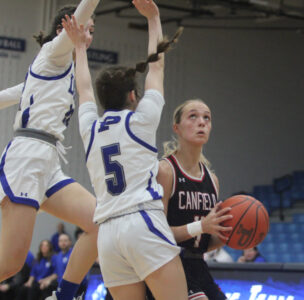Lack of aquatic plant growth natural, not man-made
Mosquito Lake has been a hot topic on social media recently and not just because of the great catches of bass, crappies, catfish and walleyes.
The fishing has been productive this spring. Anglers tallied more than 200 limits of largemouth bass during a major tournament on Mosquito in mid-May. A recent catfish derby featured a winning haul of more than 66 pounds and a 48-pound flathead. Crappie anglers are reeling in thick slabs all over the reservoir.
Good fishing typically is a happy time for anglers, but many are worried and angry, based on recent dock talk and Facebook chatter criticizing efforts to manage the growth of invasive aquatic plants.
The proliferation of aquatic vegetation has been credited with the surging population of largemouth bass and other fish species in Mosquito Lake. But the gloomy theme of many bass anglers’ conversations recently has been “they’ve killed all the weeds.”
Two people with professional knowledge about Mosquito’s fishery and environment say, however, that treatment for invasive hydrilla should not be blamed for the relative lack of vegetation this season.
Large areas of greenery that anglers fished in 2023 are significantly reduced this year. The disappearing spreads of hydrilla, milfoil and curly-leaf pondweed have prompted many to blame the authorities.
“There’s lots of misinformation people keep spreading,” Mosquito State Park manager Josie McKenna said. “In fact, we have done no treatments this year. I hear a lot of rumors, but few direct questions. The last treatment was last August and the truth is there is no residual effect on vegetation this many months later.”
McKenna said the lack of grass this spring is not a result of treatment.
“Information from Mark Warman, the aquatic invasive species coordinator from Cleveland MetroParks who has been working with us, is that this year’s cloudy, rainy weather is more than likely the reason we aren’t seeing lush vegetation right now,” she said.
Ohio Division of Wildlife fisheries biologist Chris Aman, himself an avid bass angler, said aquatic plants thrive under extended sunshine.
“We’ve had periods of lower light levels recently, so the plants have been knocked back,” he said. “I fished Mosquito in the spring and saw lots of curly-leaf, which tops out in cooler water, then it reduces dramatically when the water temperature exceeds 70 degrees.
“I know they haven’t treated for hydrilla yet at Mosquito, so what we’re seeing now is a natural thing,” Aman said. “Hydrilla is a new (invasive) arrival. Milfoil has been around for a while and we see that milfoil can come on stronger later in the season, especially after the curly-leaf dies back.”
He stated the Division of Wildlife definitely does not want to wipe out Mosquito’s grass beds. “We are concerned about hydrilla overrunning the lake, so we support management of hydrilla to make room for desirable species like curly-leaf, coontail and milfoil,” Aman said. “When the hydrilla leaves, the good stuff takes hold.”
Bass anglers Harry Emmerling of East Liverpool and John Breedlove are pleased to learn the grass situation this year is a result of nature and meddling.
“It’s good to know,” Breedlove said. “I hope they take a scientific approach each season and the grass will be evaluated. Sometimes no action is the best action. Dumping chemicals into a lake that people drink is never a good thing.”
Emmerling noted anglers at a recent Tuesday evening bass tournament at Mosquito expressed concern.
“They were all 100 percent sure that they nuked it,” Emmerling said.
But he doubted treatments were the reason.
“I was thinking they would have had to do a flyover with a C-130 to drop that much chemical over the whole lake,” Emmerling said. “I think only Mother Nature has that much power.”
McKenna noted the compound used for targeted hydrilla treatments essentially bleaches the leaves so they cannot perform photosynthesis.
“Hydrilla is especially susceptible and our native plants are much less susceptible,” she said.
Some anglers have voiced claims that authorities wish to drive anglers away from the lake and turn the lakeside property into housing developments. McKenna said that simply is not true.
“It’s all federal property and I can tell you the U.S. Army Corps of Engineers doesn’t give up land,” she said. “They have a very strict plan and will enforce it to keep the land around Mosquito Lake as natural as possible forever.”
Jack Wollitz is the author of “The Common Angler,” a book about the “why” behind anglers’ passion for fishing. Readers can email jackbbaass@gmail.com





